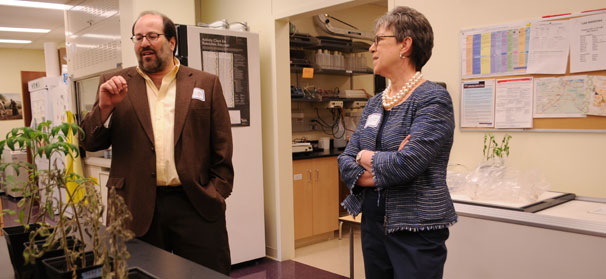

May 20, 2011Researcher receives grant to study late blight
Howard Judelson, a professor of plant pathology at the University of California-Riverside (UCR), has received a $9 million, five-year grant from USDA’s National Institute of Food and Agriculture (NIFA) to research late blight and ensure a sustainable and long-term control of this devastating disease.
Late blight, caused by a fungus-like microbe, is a plant disease that mainly attacks potatoes and tomatoes. Given that world potato production is about 320 million tons per year (20 million tons per year in the United States) and world tomato production is about 120 million tons per year (13 million tons per year in the United States), late blight is a major problem. With total costs of the disease estimated at more than $7 billion per year, it can drive farmers out of business and increase food prices.
In the United States, late blight is seen predominantly on potatoes in Eastern states like Maine, New York and Pennsylvania, but outbreaks also occur in the Midwest and West. Tomato production from Florida up the East Coast is also vulnerable to the disease. In California, late blight is mostly seen in the central valley in the early season, when conditions are moist and cool.
“Late blight is a global problem,” Judelson said. “To manage this disease, which is favored by cool, moist weather, we need a multipronged approach. In this research project, we will develop an integrated plan of research, education and Extension that includes developing diagnostic tools, resistant plants through breeding and biotechnology and systems to provide improved management guidelines to growers.”
Cathie Woteki, a USDA undersecretary, visited UC Riverside March 30 to make a formal announcement of the research grant and meet with Judelson and other UCR scientists and administrators.
“More than 40 percent of current crop production among the top 10 food crops is lost to pests and diseases annually, and that is a huge loss for farmers,” Woteki said. “USDA is funding this project to help agricultural producers win the future by ensuring our country can keep producing the food needed to meet rising global demand in a sustainable way.”
Late blight symptoms include the appearance of dark lesions on leaf tips and plant stems. In humid conditions, white mold appears under the leaves.
Infected potatoes show gray or dark patches outside; inside, such potatoes show reddish-brown lesions.
The disease is caused by Phytophthora infestans. Spores of the pathogen primarily travel in air, eventually landing on plants where the spores colonize leaves and cause them to die. Spores also can enter the soil, reach potato tubers and destroy them.
“This grant to Dr. Judelson builds on historic UCR strengths in research on this pathogen and is one more acknowledgement that UCR is a leader in agricultural research,” said Donald Cooksey, divisional dean for agriculture and natural resources at UCR. “By leading research on managing late blight, we will help protect the productivity of tomato and potato farmers worldwide.”
The research project will emphasize providing growers with better tools for managing the disease. These include better systems for making disease management decisions, plant varieties that are more resistant, tools for rapid identification of the pathogen and tools for characterizing pathogen strains. The researchers also will test and expand the use of social media and smartphone technology to communicate with growers.
The grant, which became effective March 1, has a strong undergraduate research component. Of the $9 million total award, $4.3 million is budgeted to UCR for research and education activities. The rest will be shared by 16 other institutions.
By Iqbal Pittalwala, University of California














